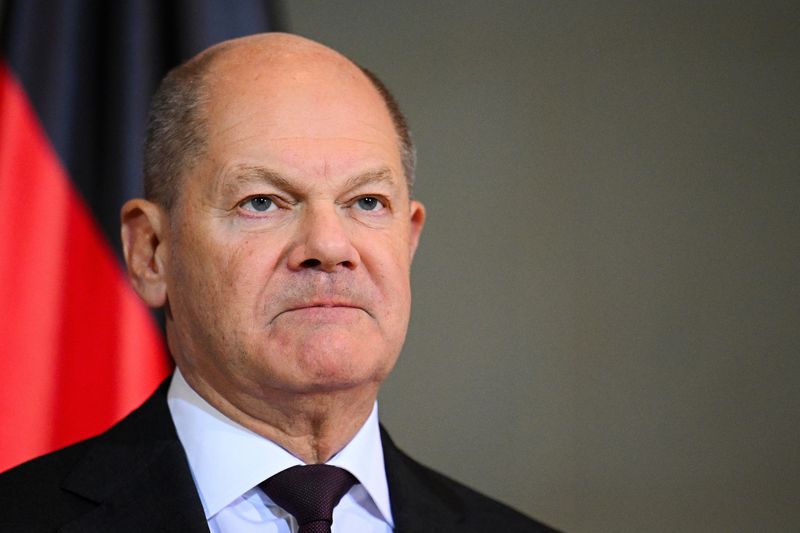BERLIN (Reuters) - Germany is expected to hold a snap election on Feb. 23 after the collapse of Chancellor Olaf Scholz's coalition last month.
Here are the main parties contending, their poll standings, and the key policy issues:
PARTIES
Germany has two, centrist big tent parties: Scholz's centre-left Social Democrats (SPD) and the opposition conservatives, an alliance of the Christian Democrats (CDU) and their Bavarian sister party the Christian Social Union (CSU).
In recent years however, they have both lost support, with smaller parties like the environmental Greens and far-right Alternative for Germany (AfD) gaining ground.
The SPD, conservatives, Greens and AfD are all fielding candidates for chancellor.
Also running are the pro-market Free Democrats (FDP), the far-left Linke and the leftist Sahra Wagenknecht Alliance (BSW), who are all at risk of missing the 5% threshold to make it into parliament, according to polls.
POLLS
The conservatives have been leading nationwide polls for more than two years and are polling 31.5%, according to the latest survey published by INSA, followed by the far-right Alternative for Germany on 19%.
The ruling SPD has dropped to third from first place in the 2021 election, on 17%, followed by the Greens on 11.5% and the BSW on 8%. The FDP and Left party are polling just 4.5% and 3% respectively.
However, analysts say polls can shift quickly, with voters less loyal to parties than they once were, recalling the 2021 election campaign when the conservatives went from frontrunner to runner-up within a few months.
The conservatives' leader Friedrich Merz in particular is considered to be prone to gaffes and quick to anger.
POLICY DEBATES
- Ukraine: Germany's mainstream parties are all in favor of helping Ukraine fend off Russia's full-scale invasion unlike the populist AfD and BSW that want an end to weapons deliveries to Kyiv and a resumption of good relations with the Kremlin.
Scholz and his SPD however have recently struck a more cautious tone - emphasizing the need for diplomacy and prudence - than the conservatives, Greens and FDP, who are for example all in favor of Germany delivering long-range Taurus missiles.
- How to revive Germany's ailing economy is set to dominate this campaign. The parties have not yet decided their programs but here are some proposals floated so far:
Scholz has proposed incentivizing private investment and updating infrastructure with an off-budget 100 billion euro fund.
Economy Minister Robert Habeck, the Greens' candidate for chancellor, has laid out similar plans to boost investment. Like Scholz, he has called for a reform of the constitutionally enshrined debt brake to allow for higher public spending.
Merz has also shown some openness to a moderate reform of the debt brake lately. Any change to the debt brake however requires a two-thirds majority in parliament. The AfD and the FDP are fierce defenders of the limit on public borrowing.
The AfD seeks outright departure from the EU in what has been called "Dexit" and wants Germany to quit the euro and reintroduce the Deutsche Mark.
- Migration: The anti-Islam, anti-migration AfD has called for borders to be closed and asylum seekers to no longer have the right to family reunification. Some senior members have gone further in their comments and were present at discussions by right-wing extremists on deporting millions of people of foreign origin including German citizens.
The conservatives have adopted a much stricter stance on immigration in recent years, advocating for pushing back asylum seekers at the borders, while calling for limits on family reunifications and naturalization for refugees.
The SPD has also toughened its position by enforcing stricter border controls and accelerating deportations although it is also seeking to increase immigration of skilled workers.
In contrast, the Greens maintain a more open asylum policy, promoting state-backed sea rescue initiatives and simplifying family reunification processes and enhancing integration.
- Energy
High energy prices remain a major challenge for households and businesses in Germany and an important election campaign topic.

The CDU, SPD, and Greens agree on expanding renewable energy to reduce costs but differ on financing approaches: the CDU suggests using higher CO2 certificate revenues to lower network fees, while the SPD and Greens advocate for debt-financed state subsidies. The CDU and AfD also propose assessing a return to nuclear power, an idea rejected by the SPD and Greens.
Meanwhile, the AfD opposes renewable energy subsidies entirely, advocating for unrestricted coal-fired power plant operations and abolishing CO2 pricing to lower consumer costs and enhance energy security.